Helena P. Schrader's Blog, page 43
January 8, 2017
Cast of Characters: Sir Bartholomew

Introducing the Fictional Characters in the Balian d'Ibelin Trilogy:
Sir Bartholomew is an indispensible character. He is as essential to the novel as vassals and tenants were to feudal society. And like the army of "good vassals" he can get lost in the background, be overlooked or forgotten as flamboyant nobles and imperious princesses take center stage. But Sir Bartholomew is "the salt of the earth" and without him Envoy of Jerusalem would have less heart and less relevance.
On the one hand, Sir Bartholomew represents the "rear vassals" and household knights that were the backbone of army of Jerusalem. There were never more than a couple score of barons in the crusader states, and the feudal levee never fielded more than 1,200 knights -- including the militant orders. The bulk of those 800 or so secular knights were men like Sir Bartholomew, men with a small land-holding from which they earned enough to outfit themselves, a squire, and their horses. (Recent archaeology, by the way, has uncovered a number of "manor houses" for such knights, proving conclusively that the Latin elite did not live exclusively in the urban centers.) The importance of men like Sir Bartholomew was that they gave the Kingdom of Jerusalem a heavy cavalry capable of delivering a crippling blow on Saracen armies many times longer -- provided they were well led and the cavalry charge was properly timed and directed.
More importantly, however, Sir Bartholomew represents all fathers who have lost or have missing children. He embodies the terrible suffering of survivors of a catastrophe, which has carried away loved ones. He gives a voice to the spiritual doubts that all men feel when confronted with loss and grief that goes beyond what they think they can bear.
Sir Bartholmew's importance to the novel is enormous. He is a constant reminder of the human cost of defeat.
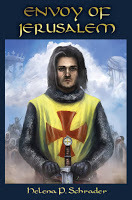
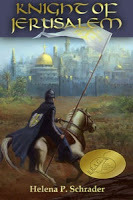
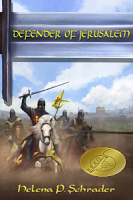
Buy now! Buy now! Buy now!
Published on January 08, 2017 00:26
December 31, 2016
Cast of Characters: Alys
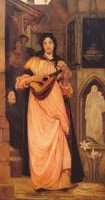
Today my series on the fictional characters in my Balian trilogy continues with Alys.
Like Godwin Olafsen, Alys was an unintended character. I never intended to write about her, but once she had sung her first notes in Envoy of Jerusalem it was impossible to ignore her. When Alys steps into the tavern in Tyre to sing for her supper to avoid selling her body, she has a song to sing, but defeat and poverty have robbed her of her dreams -- indeed of her ability to dream at all. She is tottering on a precipice. A innocent victim of defeat and poverty.
No, I had not envisaged Alys when I wrote the outline for Envoy of Jerusalem because she isn't part of "history." How can the daughter of an obscure (and dead) saddler compete with the likes of Richard the Lionheart and Saladin? But Alys does have a song to sing -- for all her sisters trapped in a hopeless situation after a lost war. Alys sings for the Syrian refugees, and those from the South Sudan and Somalia, as well. She represents the millions of women who have lost their homes, their families, their livelihoods, and have nothing left to sell but a song -- or their bodies.
Envoy of Jerusalem is as much about Alys as it is about Richard the Lionheart because a central theme is the role of women in society. In powerful women like Maria Comnena, the Queens Sibylla and Isabella the novel examines the various ways in which women were active and influential even in a world at war, but it must also expose the helplessness and vulnerabilities of those women without status, titles and wealth. Envoy of Jerusalem seeks to show the strengths and determination of "ordinary" women -- and that is Alys' role. Altogether, the novel seeks to encourage the reader to think about how women shape society itself and what the position of women tells us about the society in which they live.
In Envoy of Jerusalem, a queen and a prostitute sit side-by-side in a church and find common ground.
Oh, and Alys gives us the best love story of this novel....



Buy now! Buy now! Buy now!
Published on December 31, 2016 00:14
December 26, 2016
Cast of Characters: Sister Adela
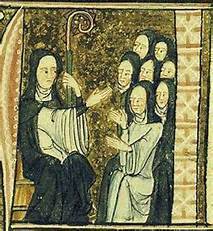
Introducing the Fictional Characters of my Balian d'Ibelin Trilogy:
My fictional character Sister Adela is woven into the latter two books of the Balian trilogy, rarely playing a prominent role but often voicing an important perspective. Like Mariam, she is an independent woman with considerable power in her own sphere. Through Sister Adela the reader learns about the fate of orphans, the conditions in hospitals, and is reminded of the extensive network of charitable institutions run by various religious houses that were such an important part of medieval society. Sister Adela also personifies the greater authority and respect accorded women by the Knights Hospitaller as opposed to the Knights Templar--that never had associated sisters or convents.
Sister Adela is another character who deserves a book of her own, but she prefers (as is befitting a self-effacing nun) to remain in the background and rejects center stage. I feel I have to respect her wishes on this, but I hope my readers will recognize her many merits in her cameo appearances in the latter too books of the Balian trilogy.



Buy now! Buy now! Buy now!
Published on December 26, 2016 02:55
December 18, 2016
Cast of Characters: Haakon Magnussen

Introducing the fictional characters in my Balian d'Ibelin Trilogy:
Because of the importance of naval and amphibious warfare in the period covered by Envoy of Jerusalem, I wanted to include a "nautical" character. A Pisan or Genoese sea captain would have been more representative of the age, but the Italian city-states came to the Holy Land as much (if not more) for commercial advantages as for religious reasons, and I didn't want to get into that can of worms. I was intrigued, however, by the fact that the Norwegians sent a large contingent of crusaders at this time. I also liked the idea of reminding my readers that the Norsemen had been Christianized (for the most part) by this time. It also seemed appropriate to have a Norse ship's captain as a character in order to describe the kind of vessel Richard the Lionheart chose as his flagship -- a snecka -- which was essentially a Viking warship that had been adapted over the centuries. Besides, I've lived in Norway and my mother's family was Danish, so I grew up loving Viking ships and Viking myths. So Haakon Magnussen was born -- full-grown and out of the foam of a stormy sea.
Haakon himself represents the "independent" crusader. Although we tend to think of the crusades as organized events led by kings and nobles, the majority of "crusaders" were individuals who made an armed pilgrimage to the Holy Land to fulfill a vow, atone for a sin, or simply contribute to the defense/restoration of Christian rule. They might join up with others, sign on with a local lord, travel in the train of an organized crusade, or they might, if they had the means, just come out on their own. Who could better represent that independent spirit than an Norseman?
In the novel, Haakon is also a device to get Balian out to sea and a means of moving him in an environment where the Saracens controlled most of the hinterland behind the few Christian coastal strongholds. He also has a voice and perspective of his own, generally irreverent. One of my test readers liked him best of all the fictional characters, and I strongly suspect he deserves a novel all his own....



Buy now! Buy now! Buy now!
Published on December 18, 2016 00:48
December 11, 2016
Cast of Characters: Mariam, the Syrian Femme Sole
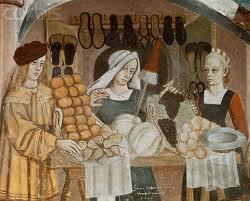
Introducing the fictional characters of the Balian d'Ibelin Trilogy:
Mariam, the Syrian Femme Sole, doesn't make her appearance in the Balian d'Ibelin trilogy series until the third book. I wish I'd thought of her sooner, though, as I would have loved to include her in the earlier books as well!
Mariam came to me in all her robust and hearty maturity in the middle of the night just after I'd finished writing Defender of Jerusalem. I was disturbed by poor Godwin Olafsen and his horrible fate. Yes, Balian had bought his freedom at the last minute, but he was still penniless with a crippled son. I didn't like leaving him like that. And then I had the image of Mariam, heard her scolding me in a cheerful voice, and I knew she was the answer.
Mariam also has the important role of representing the Syrian population in the crusader states AND the many empowered women in the middle ages who were businesswomen and master craftswomen. Mariam is a native, Orthodox Christian, an ethnic group that made up a substantial minority in the Kingdom of Jerusalem. She is also an astute and successful businesswoman as was quite common across Europe in this period -- contrary to common myths about women being "mere chattels." Her role may be comparatively small, but I hope my readers enjoy Mariam's brief appearances.



Buy now! Buy now! Buy now!
Published on December 11, 2016 00:03
December 4, 2016
Cast of Characters: Godwin Olafsen
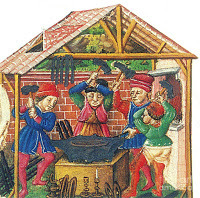 Continuing my series on the fictional characters in my Balian d'Ibelin trilogy, today I want to introduce Godwin Olafsen.
Continuing my series on the fictional characters in my Balian d'Ibelin trilogy, today I want to introduce Godwin Olafsen.Godwin makes his appearance only at the end of Defender of Jerusalem, and I will confess he came to me rather spontaneously. He wasn't really planned, but when writing about the siege of Jerusalem it was important to show it from more perspectives than the exalted one of Balian himself. Balian was a nobleman and the commander. His perspective is critical to history and the novel, but Jerusalem was filled with 60,000 refugees and 20,000 inhabitants. I needed to take the reader out of the palaces of kings and down to the ordinary "man-on-the-street." So I developed several different scenes that shed light on different segments of the population -- the Syrian Christians, for example, nuns, and, the working class.
Once I decided on a scene from the point of view of the Latin working class, I wanted the character to exemplify a common pattern of settlement, namely, a man and wife coming to Jerusalem on pilgrimage and then not returning whence they'd come but rather settling in the crusader state. This is what led me to the idea that Godwin would have a crippled son that he and his wife had brought to Jerusalem hoping for a miracle--which doesn't happen. So, destitute and disappointed, the couple remains in Jerusalem. Up to this point, my brain created Godwin.
Then I started writing and Godwin took over. Suddenly I understood about his embittered wife, and his lack of business acumen. It became equally "obvious" that Godwin had to make Balian's sword. (The terms of Balian's safe-conduct from Saladin required him to go to Jerusalem without a sword.)
When I was writing the final scene describing the people who were unable to pay their ransom, I knew it would be more effective if at least one of the "paupers" in the crowd was someone the reader already knew and could identify with. Godwin was the perfect choice because he had impoverished himself in the service of Jerusalem, and now was paying an unjust price. That made him worthy of sympathy, and at the same time he was also a distinctive figure with a child on his shoulders that made it plausible that Balian would see and -- because he'd given him his sword -- would also recognize him. Thus Godwin plays a pivotal role in illustrating Balian's position, and inspires the final line in Defender of Jerusalem.
After that ending, he had to play a role in Envoy of Jerusalem too. Here he again represents the working-class settlers that made up roughly 20% of the population of the kingdom. His story line is secondary, but important as a reminder that there were 140,000 settlers in the crusader state, and many were men like Godwin who were skilled craftsmen working in urban areas.



Buy now! Buy now! Buy now!
Published on December 04, 2016 00:07
November 27, 2016
Cast of Characters: Eschiva
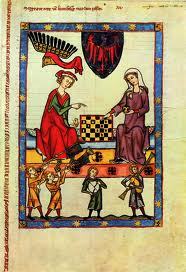
Continuing my series on the characters in my Balian d'Ibelin Trilogy: Eschiva d'Ibelin is the second of my quasi-fictional characters. She is a real, historical figure, indeed the founder of a dynasty that ruled Cyprus for over three hundred years, yet aside from her existence we know very little about her.
What we do know about her is that she was the daughter of Baldwin d'Ibelin, the Lord of Ramla and Mirabel, and his wife Richildis, making her Balian's neice. She was married at a very early age to Aimery de Lusignan, before his brother came to Jerusalem and seduced his way into a crown. We also know that she had at least six children by Aimery, three of whom lived to adulthood. We also know that Eschiva was "captured by pirates" and held for ransom in or about 1196; she was rescued by the King of Armenia, who had "high regard" for members of her family (i.e. the Ibelins, not the Lusignans.) She was released to her husband and sailed back to safety on Cyprus. There Eschiva lived long enough to know the Holy Roman Emperor had recognized her husband as King of Cyprus, but died shortly before his formal coronation in the fall of 1197. We do not know how old she was when she died or the cause of death. Within a few months, however, her husband had remarried, this time to Queen Isabella of Jerusalem, the daughter of her Aunt Maria Comnena.
In between these naked facts is a huge amount of possible drama. Eschiva was married to a landless adventurer as a child, and ended up married to a king without changing husbands. Her father married her to one Lusignan, but hated his brother so much that he preferred to renounce his land and titles and leave the kingdom rather than swear homage to him. Where, the novelist asks, did that leave Eschiva? Physically she stayed with her husband, but was her heart with her father? Maybe, but then maybe not; after all her father had divorced her blameless mother to marry someone more influential -- who would give him sons.
Eschiva lived in the very vortex of Jerusalem politics in the last two decades of the 12th century. She was an Ibelin by birth and a Lusignan by marriage and she founded a dynasty that would rule Cyprus for more than 300 years. But was she politically active? Did she have a say in affairs of state? Did she whisper advice to her husband? Or did she console and support her sister-in-law Sibylla? Was she there telling Sibylla not to renounce Guy, no matter what the pressure was from the High Court? Or did she see what her father and uncle saw? That Guy would be a disastrous king, and try to talk Sibylla into doing the reverse? Unless new sources come to light, we will never know.
As a novelist, however, I have given Eschiva a positive role. I see her as the bridge that enabled the Ibelins to later become the most powerful supporters of the Lusginan dynasty on Cyprus. Historians puzzle over the fact that the Ibelins, who were inveterate opponents of Guy de Lusignan, could so quickly become entrenched in his brother's kingdom of Cyprus. I see Eschiva as the key -- along with the fact that I don't think Aimery was as much in Guy's camp as he is usually assumed to be.
My Eschiva also represents the gentler medieval wife -- a contrast to my other female characters such as the imperial-born Maria Comnena, or the princesses Sibylla and Isabella. Eschiva is content to be a wife and mother. Eschiva's courage is subtler, but not less than that of the others. She is also wise without being witty, and she is often the one who provides commentary on the rest.
Although Eschiva is only a supporting character in the Balian Trilogy, she will play a more central role in my current work in progress, The Last Crusader Kingdom. This book describes the establishment of the Kingdom of Cyprus (including the episode with the pirates that capture Eschiva.) Meanwhile, discover Eschiva in all three of the Jerusalem trilogy:



Buy now! Buy now! Buy now!
Published on November 27, 2016 01:59
November 20, 2016
Cast of Characters: Ernoul
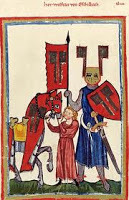
Envoy of Jerusalem, being biographical fiction, is populated predominantly by historical figures--from Balian d'Ibelin himself and his wife to Richard the Lionheart. In earlier entries I introduced the most important of these characters such as the Leper King, Guy de Lusignan and his brother Aimery, the queens Sibylla and Isabella etc., providing short biographies. But no novel lives entirely from characters so significant that they left a mark in history. Furthermore, I enjoy writing in characters that I can "control" completely and develop without regard for historical reality. Over the next several weeks I will be introducing the completely fictional "supporting cast" from Envoy of Jerusalem one at a time.
First, however, I need to explain about two characters that are more fictional than real despite being real people: Ernoul, Balian's squire, and Eschiva, his niece. While both these characters actually lived and are mentioned in the historical record, very little is known about them beyond their names and station. As a result, I have effectively invented their characters. Today I will explain about Ernoul.
Ernoul was the author of an account in the vernacular (French) describing the last decades of the 12th century in the Kingdom of Jerusalem. We know his name because he tells it to us in a single passage in which he also describes himself as being in the service and company of Balian d'Ibelin. The circumstances make it most likely that Ernoul was a squire to Ibelin at the time of the incident described (the battle at the Springs of Cresson late 1186). However, we know literally nothing else about "Ernoul" -- which was likely a variant French spelling of the now more familiar name Arnold.
If the assumption about Ernoul being a squire in 1186 is correct, he was probably from another noble family in Outremer and little more than a teenager at the time of Hattin. The loss of the kingdom would have left him penniless and landless and like many other young noblemen from the former Kingdom of Jerusalem, he would have had to make a new life for himself either in the much-reduced and reorganized Kingdom of Acre or on Cyprus. Margaret Ruth Morgan, a historian who studied the various texts based on his lost chronicle in great depth, has suggested he is the same person as a certain Arnaux/Arnais de Gibelet, who was later an influential person in the Kingdom of Cyprus -- at a time when Balian's eldest son was one of the most powerful barons on the island.
Furthermore, Ernoul's orginial account of the events surrounding the fall of Jerusalem has been lost. What we have today are fragments of this account incorporated into chronicles copied down by monks in various places in the West. The clerical chroniclers were concerned with recording history by integrating different sources to try to create as comprehensive a picture of events as possible. They did not, in the modern usage, provide footnotes of their sources, nor care much about preserving intact the authentic voice of any of their sources, let alone this comparatively obscure man from Outremer. The chronicles were furthermore revised and corrupted by frequent copying over time. The text gradually became corrupted; whole passages were omitted. In short, we have little more than snippets of Ernoul's original work.
Aside from the one presumed "fact" that Ernoul was a youth from a local, noble family in his late teens in 1186, we know nothing about Ernoul. We don't know when he was born, when he died, if he was the eldest son (heir) or a younger (landless) son, if and when he married, if he had children, if he was later powerful and influential, or -- significantly -- when he wrote his account. The fact that he wrote in French rather than Latin does suggest he was not a cleric, however, at the time of writing, so he is presumed to have pursued a secular career. The assumption of historians is that he wrote several years after the fact, that he had the perspective of the "poulains" (the natives of Outremer), and that he was biased in favor of the Ibelins and so painted Balian in a particularly favorable light.
As a novelist, I wanted to integrate this important historical source into my story, and I decided that if a secular man was literary enough to write a history (albeit in the vernacular) in later years, he might have been a lover of literature as a young man too. My Ernoul is therefore a youth initially intended for the Church, who only finds himself in training at arms because of the untimely death of his elder brother. Once I'd made Ernoul a bit bookish, I found it easy to make him an amateur musician as well, and so a composer of songs. My Ernoul is, you see, not terribly good at knightly skills and so channels his energies into other fields. (An interpretation supported incidentally by the fact that Arnais de Gybelet, that Morgan believes to have been Ernoul's identity in 1232 was a noted jurist, i.e. still a man of the pen more than the sword.)
The Ernoul of my novels is an artist (composer) rather than a fighter, and he sees the world through an artist's eye. He also provides some of the lighter moments in the book. I hope my readers will like him as much as I do!



Buy now! Buy now! Buy now!
Published on November 20, 2016 00:47
November 12, 2016
Chivalry and Balian d'Ibelin: Compassion
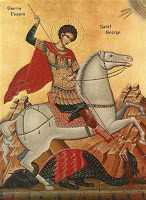
The essence of compassion is the ability to sympathize with others, indeed to take pity on them to such an extent that one is prepared to assist them even if it is not one's duty to do so. A compassionate person goes beyond the norm of what is expected to provide aid and assistance to another. For medieval knights, St. George was a popular example of a knight who risked his life to rescue the classical "damsel in distress." Obviously, to the knightly class it was particularly attractive that St. George did this with lance and sword, exercising courage and prowess as well as compassion.
Balian d'Ibelin's compassion is dramatically documented by his defense of Jerusalem.
Ibelin need not have gone to Jerusalem, and once there he could have refused to assume command of the defense. He could have kept to the terms of his agreement with Salah ad-Din and taken his wife and children to safety. Instead, he remained in the Holy City -- risking not only his own life but that of his family -- because he was moved to pity by the thousands of refugees that had flooded the city. Although he knew that the defense was hopeless, he also realized that without professional leadership, the situation in Jerusalem would be worse than under a disciplined and experienced commander. He recognized that in the absence of strong leadership, it was the weak and helpless that would be most vulnerable as the situation deteriorated.
Yet nothing demonstrates Balian's intense compassion so much as the surrender of Jerusalem. First, rather than seek a martyr's death or secure a surrender that saved the lives of those with means (the upper classes, merchants and fighting men), he negotiated a surrender that included the poor. Recognizing that many refugees (particularly widows with several children) would never be able to pay Saladin’s price of 10 deniers per man, 5 per woman and 2 per child, he persuaded Saladin to accept a "lump sum" payment of 30,000 bezants for those too destitute to pay individual ransoms.
When even this sum this proved insufficient for the number of poor in the city, Ibelin made an offer that is striking in its compassion: he offered to surrender himself to Saladin as surety until money for their ransoms could be raised. In short, he offered to give up his own freedom, the chance to be reunited with his wife and children for an indefinite period of time -- possibly forever -- in order to secure the freedom of paupers. I can think of no similar gesture by a medieval nobleman before St. Louis that is comparable in quality. This gesture alone discredit's the slander of the Itinerarium that calls Ibelin cruel, fickle and faithless. Whatever else Balian d'Ibelin was or was not, he was a knight of great compassion.



Buy now! Buy now! Buy now!
Published on November 12, 2016 00:42
November 6, 2016
Chivalry and Balian d'Ibelin: Mercy, Kindness and Generosity
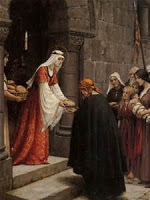
Medieval society with its many poor, ill and afflicted members had a high need for mercy, charity and kindness. In the absence of social welfare and state-run institutions, care for the sick and the aged, for orphans, and the mentally ill fell to the charity of others. Many hospitals and hospices were run by religious organizations, particularly the Knights Hospitallers in the Holy Land, but these in turn depended on the generosity of private patrons. Wealthy individuals were expected to give alms directly to the poor or to bequeath land to religious institutions to enable them to earn enough to finance their charitable operations. The large number of lepers in the Middle East in the period gave rise to the creation of an entire religious order dedicated exclusively to the care of lepers, the Knights of St. Lazarus.
Other faces of mercy, kindness and generosity in the medieval world were found in the behavior of a lord to his vassals, servants and serfs. In the hierarchical society of the Middle Ages, a lord's word was essentially law, and it was easy for a man with power over many serfs and servants to abuse that power with impunity. Only the moral sanctions of the Church -- and the ideals of chivalry -- seriously inhibited the misuse of power by lords.
The reverse side of the coin, however, was that lords (and ladies) had many opportunities to demonstrate mercy, kindness and generosity. They could forgive debts, excuse misdemeanors, distribute alms, offer employment and provide patronage. They could adopt children, finance dowries or training for orphans, or establilsh entire institutions of learning or healing. Those who were exceptionally generous, such as Elizabeth of Thuringia and Louis IX of France, were eventually canonized for their generosity.
Likewise, the rules of medieval warfare gave the victor complete control over a vanquished enemy. A man was within his rights to slay a surrendered enemy. The custom of ransom often made it more lucrative to allow a prisoner to buy his freedom than to kill him, but in the heated and gory context of a medieval battlefield sparing an enemy's life was also an act of mercy -- even if the latter brought material gain.
As with so much of Balian d'Ibelin's life we have no direct evidence that he was merciful, kind or generous. Indeed, his detractors specifically called him "cruel." Yet he appears to have won his step-daughter's affection (which seems unlikely if he were a cruel or indifferent step-father). More speculative but intriguing: one wonders if Saladin's astonishing willingness to give him a safe-conduct -- and then forgive him for breaking his word about leaving Jerusalem -- was because of an earlier act of mercy or kindness by Balian to one of the Sultan's friends or family. We will never know.



Buy now! Buy now! Buy now!
Published on November 06, 2016 01:59



